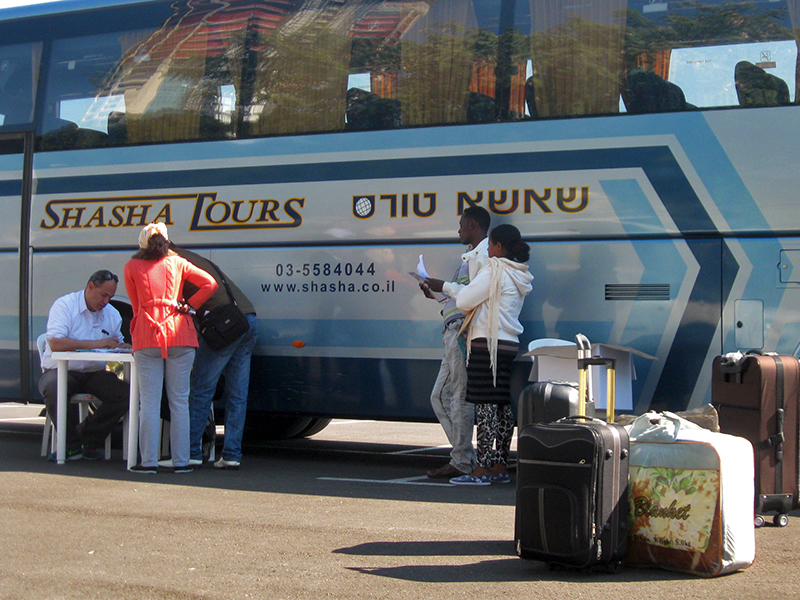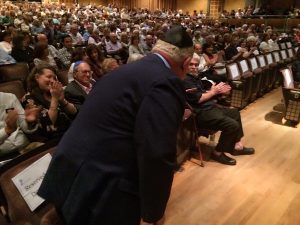Aline Perez and her husband, Anthony Evans, came to Holy Blossom Temple in Toronto on Feb. 27 to seek help for Yohannes Shishay, a 23-year-old Eritrean asylum seeker living in Israel.
When he was 17, Shishay was kidnapped and beaten twice, before his mother sold all her belongings to pay off his kidnappers, Perez said.
Shishay has been in Israel for six years, but according to Perez, he has been put on notice that he will soon have to choose between being deported to Uganda or Rwanda, where he does not speak the language, or be incarcerated indefinitely in an Israeli prison.
“It breaks my heart to see him in this horrible situation,” she said. “I hope that somehow I can find a way to bring him to Canada, so that he can start his life over again.”
READ: PROTESTS HELD AROUND THE WORLD AGAINST ISRAEL’S POLICY ON ASYLUM SEEKERS
Perez and Evans were among the 150 people who packed the temple’s social hall for a discussion of the Canadian Jewish community’s response to the tens of thousands of African asylum seekers living in Israel. A sizeable number of Eritreans showed up, as well.
Former Canadian justice minister Irwin Cotler addressed the group via Skype. He said that there is little support for the African asylum seekers from most levels of the Israeli government and that until recently, most Israelis were indifferent, as well.
He said he was heartened by a “watershed event” that occurred on the evening of Feb. 24, when 20,000 African asylum seekers and Israelis demonstrated in south Tel Aviv to protest the government’s plan to deport the Eritrean asylum seekers, which is set to begin in March.
He said the Israeli courts are inaccessible to the Eritreans who are facing deportation.

He noted that the people being targeted for deportation are single men between the ages of 21 and 45 – families, children and women are excluded.
Cotler said it was critical to avoid “inappropriate analogies to the Holocaust,” because they tend “to distance people.”
He said he commends the Canadian government for allowing some of the asylum seekers to come to Canada.
Daniel Schild, co-chair of Canadians Helping Asylum Seekers in Israel (CHAI), spoke about a new tax that Israel had imposed on the refugees. The government is taking 30 per cent of their wages, and the money will only be refunded when they leave the country.

After witnessing a demonstration in Israel against the tax, Schild helped establish CHAI, an advocacy group that raises money for asylum seekers in Israel and increases awareness of their situation.
CHAI also lobbies the Canadian government “to expedite immigration approval for asylum seekers in Israel to come to Canada” and “encourages others in the Jewish community to sponsor asylum seekers.”
Dawit Demoz, 31, a refugee from Eritrea with permanent residence status in Canada, said that he suffered at the hands of human traffickers in Sudan, Libya and Egypt. “It’s the story of 5,000 Eritreans who are fleeing their homeland every month,” he said.
“It’s the story of 38,000 asylum seekers living in Israel. It’s the story of the 900 Eritreans who are currently detained in the so-called ‘open detention’ in the Sinai desert. And it’s the story of the 17 Eritreans who were sent to indefinite detention last week by Israel because they refused to go to Rwanda.”
It breaks my heart to see him in this horrible situation.
– Aline Perez
He explained that the mandatory military service in Eritrea is “forced labour and slavery.”
Demoz said that Eritrean citizens have few options: they can “suffer in silence,” speak up and be jailed and/or killed, or flee the country.
Other speakers that evening included Leah Breslow of the New Israel Fund of Canada, Lia Kisel of Jewish Immigrant Aid Services, Noah Shack of the Centre for Jewish and Israel Affairs and rabbis Yael Splansky and Michael Satz of Holy Blossom. The evening was moderated by Karen Mock, president of JSpaceCanada.








